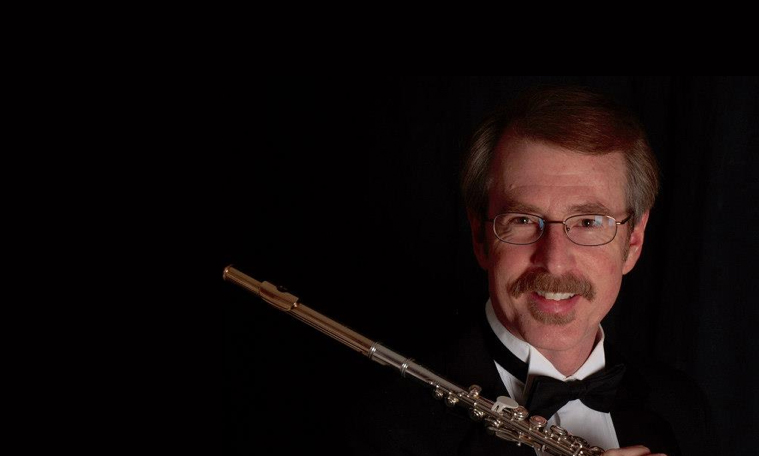I think I first heard Roger Martin play as part of the Cumberland Quintet at an honor band in high school, which we’ll just say was plenty long ago! I was and have continued to be inspired by his beautiful playing, his warmth and personality, and the high quality of the students he has taught in his long career at Tennessee Technological University. In this interview, he will share his story as well as some excellent advice on teaching the flute. He retired from TTU at the end of the Spring semester, and while he will be sorely missed, the scores of his students who are now in the world teaching and performing carry his legacy and his standard of excellence with them!

Tell us about your background. What drew you to the flute and to music as a career?
When I was ten years old, my thirteen-year-old cousin showed me the saxophone she had just started playing in beginning band. My reaction was, “Wow! That is so cool!!” When the time arrived for me to be able to start beginning band, my parents bought me a saxophone and off we went. Through junior high and high school, I picked up the other woodwinds one by one and even got into Virginia All-State Band on contra-bass clarinet my junior year. I also played bassoon in the Tidewater Youth Symphony. The summer before my senior year, I got a job in the pit orchestra of a local dinner theater playing the reed one books.
A good friend from middle school and I had planned to be architects as a career but when it came time to start looking for college programs, I realized that I was too hooked on music to do anything else. In the fall of 1975, I began my college study at Virginia Commonwealth University as a Saxophone Performance major while also taking lessons on flute and clarinet (for the first time!). As it became apparent to me in my sophomore year that I was no jazzer, I thought I’d better switch my major to one of the orchestral woodwinds and settled on the flute for two reasons: 1) the flute has a lot of good music and 2) the flute has no reeds to worry about.
The summer after my freshman year, I auditioned for Busch Gardens–Williamsburg and was hired as a clarinetist for one of the German bands. I kept this job for six summers while continuing to play in pit orchestras for regional theaters. I thought, “Maybe I should work toward trying to get a pit orchestra job on Broadway.” Armed with this new goal, I began a Masters degree in Woodwinds Performance at Florida State University. I began visiting New York City every six months or so and on one trip, talked with a bassoonist from the pit orchestra for “The Pirates of Penzance.” He told me that the way to get into a Broadway pit orchestra was to move to New York, meet the contractors and performing pit musicians and work toward getting a sub job which would, in effect, be my audition for further work. I realized I had made a big mistake by not coming to New York City for college as I didn’t see how I could move to New York, get a non-music job until I might have the chance to sub and stay in shape on six instruments in the meantime. Back to the drawing board! I would work toward a doctoral degree in Flute Perfomance at FSU with the new goal of getting a college teaching job. Fortunately, this plan panned out. After another year in Tallahassee I got a sabbatical replacement job at the University of Missouri-Columbia and then my first tenure-track job at Minnesota’s Moorhead State University the following year. After five years at MSU I applied for and got the job at Tennessee Tech University where I have just completed my twenty-ninth year. A huge fringe benefit of having a job near Nashville which I had never considered was freelance playing in the recording studios and work with The Nashville Symphony, The Nashville Chamber Orchestra (now defunct) and other area pick-up orchestras. I was very fortunate to get to be involved in all of these.
 As a performer, you always have such joy, skill and expressiveness. How do you encourage those things in yourself and in your students?
As a performer, you always have such joy, skill and expressiveness. How do you encourage those things in yourself and in your students?
First of all, thank you very much for the compliment! Perhaps all those years observing actors from the pit instilled in me the importance of “selling” the product. I’ve always been aware of the theatrical component of presenting a music concert and tried to employ appropriate gestures to emphasize what’s going on in a piece of music. I also think it is very important to project enthusiasm from the stage; walk out briskly with a big smile. As the song “Whistle a Happy Tune” says, “When I fool the people I fear, I fool myself as well.” I think there is really something to this.
In my sabbatical replacement job at the University of Missouri-Columbia, I played in the faculty orchestra and the first concert was Bach’s St. Matthew Passion, which contains a flute obbligato movement with tenor and soprano where there is no place to breathe except between sixteenth notes. Add to this stressful situation the fact that the two movements prior to the obbligato movement are tacet. During the performance, I was really winding myself up into a nervous frenzy with nervous thoughts. I wondered, “What will they think of the new guy?” Realizing I had to calm down, I consciously decided to shift my focus to positive thoughts. “Listen to that fantastic horn player. I’m so lucky to have this job! The orchestra sounds lovely,” etc. It worked! This calmed me down and shifted my mental focus to the task at hand rather than the quagmire of judgmental thoughts which had been engulfing me. I have since told this story to my students, telling them to use “The Peter Pan Principle” – think lovely thoughts.
In these ways, I think I have modeled, as you say, “joy, skill and expressiveness” for my students in faculty recitals. Of course the skill part consists of diligent, conscientious preparation, for which there is no substitute. I make sure my students hear this plenty while suggesting a multitude of ways to be well prepared, both technically and mentally. Good mental preparation includes being ready to perform at least two weeks before the actual date, recording and evaluating trial run-throughs, familiarizing oneself with the performance space, having sufficient rehearsals with the pianist and other colleagues on the program, performing frequently for friends and family, and finally, not hammering on your repertoire the two days before the performance, but actually starting work on something new to bring back the spirit of freshness. Realize that the audience really does want you to do well. And here is a big one – there is no substitute for frequent performance. I encourage my students to give a recital (or two!) every school year and seek out as many additional performance opportunities as possible. It’s critical. A teacher can give splendid advice about dealing with performance nerves all day long but it is squarely up to each student to live through the process and grow from experience.
You have been at Tennessee Tech for a long time. What are some of the pleasures and challenges of teaching and performing with the same people for many years?
One of the most wonderful aspects of my job at Tennessee Tech has been rehearsing and performing regularly with the Cumberland Quintet. I believe the secret to getting along with those one plays with regularly is mutual respect and plain old good manners. If you can also be good friends, so much the better, and we in the Cumberland Quintet have enjoyed life-affirming friendships. This is not a given. We have just been lucky. I can honestly say that in all the trips we’ve taken over the years to play concerts there has never been one minute of friction between us. Though differences of opinion might arise in rehearsals we always made the common good (and having a good time!) a priority. Never underestimate the power of intention and attitude.

To me, you seem to have happy, healthy, well-adjusted students. What is the ideal student-teacher relationship like, in your opinion?
There are several important factors; be honest without being hurtful, remember to compliment good qualities and acknowledge incremental improvements, be humble rather than haughty and foster an atmosphere of mutual respect. This includes taking an interest in each student as a person, independent of their level of musical ability. Ask students about their lives outside the studio without feeling the need to tell them about yours. Indeed, there are many parallels to parenting. Be mindful of being a positive role model, both as a person and as a musician.
Over the years I have also learned to take every student from where they are with regard to both musical ability and maturity level.
It’s no good to anyone to act as if they should be other than they are. If someone comes into the studio at a level below what the teacher may like to expect, resolve to be helpful and encouraging. This comes back to mutual respect. Who knows? They may get to work and surprise you. If not, be honest without being hurtful.
If there were one skill that you wish more incoming freshman music majors possessed, what would it be?
I think it goes without saying that prospective music majors need to be music addicts. This is not a field to go into for the money. One should choose music as a career because he or she can’t imagine doing anything else.
Being successful as a musician takes self-discipline, personal motivation, insatiable curiosity and the ability to persevere.
Having said that, one of the things I wish more students would come into a music degree with is an acute sense of listening. This is a personal crusade of mine with students. Do they truly hear what and how they are playing?
I think a good deal of responsibility for refinement of listening skill falls to teachers (both private and ensemble directors). Here’s what I mean. How often as teachers do we dominate our battery of suggestions to the mechanics of playing the instrument? Breathe like this. Form your embouchure this way. This is how you articulate. Open your throat, etc. Doubtless, these are critical elements of successful playing but I find that not enough teachers direct students’ attention to actually hearing the result of incorporating mechanical suggestions. I believe we easily make the mistake of thinking that our students hear all the details of the sounds they are producing as we, their teachers, do. The result is that students end up focusing on how it “feels” to play more than they pay attention to how it actually sounds.
One of my duties at Tennessee Tech has been teaching the Woodwind Methods Class for Music Education majors, and I frequently remind them of what I feel is an important hierarchy of suggestions: 1) a listening comment, 2) a breathing comment, 3) other mechanical suggestions. As a teacher, this takes awareness of thought. It is very rewarding to have the important mechanics of tone production figured out and to be able to clearly verbalize them and as a result, we easily assume students really are listening as attentively as we are. Do not take this for granted!
Can your students match pitch and sing a sequence of notes accurately? They should! If they cannot, helping them to do so should be a primary aspect of instruction. I like to tell students, “If you can hear it, you can play it.” In my experience, getting a student to accurately sing the notes of a difficult technical passage (sing in half notes – rhythm doesn’t matter in this exercise), they nearly always play it much more accurately than if they had spent 20 minutes doing every altered rhythm and varied tempo practice technique. Of course, these “repair” techniques have their place but without a real awareness of how the sequence of pitches sound they are simply pushing keys, blowing, and hoping the right music comes out. It’s like playing darts with a blindfold on. Good luck! Again, in my experience, five minutes spent on accurately singing difficult passages is more beneficial than twenty minutes of standard “woodshedding.”
When you look back on your teaching career, what is most satisfying?
“Aha” moments are the best. There is nothing better than observing an immediate positive impact and the resulting excitement of recognition. Sharing the thrill of a successful performance is a joy. Save your critiques for the next lesson and only comment on the positive aspects of a performance immediately afterward. Another pleasure is watching your relationships grow, both during the course of study and afterward.
What’s next for you as you transition into retirement?
I have to admit that at the time of this interview (with only two weeks remaining in my college teaching career), the thought of not doing what has become a great part of my identity over the past 35 years is both weird and a bit scary. I suppose new life chapters always feel this way. Having said this, my current plans include more travel and family visits, playing with the big flowerbed in my yard and exploring some new creative activities. Who knows what tomorrow holds?! My resolve is to take it a day at a time with gratitude for each moment.


Roger took my position at Missouri while I went to spend a year at FSU. We ended up knowing so many people at both schools, but not each other. We fixed that by rooming together at some Flute Conventions. It can be a little scary changing your life, but exhilarating! What wonderful advice he has to offer! I met a tuba student from Tennessee Tech, and he told me you could hear Roger’s laughter everywhere! We share something with our teacher, Charles Delaney, a love of the pit! When I was an undergrad at the U of I Charlie conducted the musicals, and I played in every one. I was never as versatile as Roger, but I knew that I got a special satisfaction from playing in the pit. Congratulations on a great career, and a great interview.
Thanks for sharing Steve! The flute world is so connected, right?